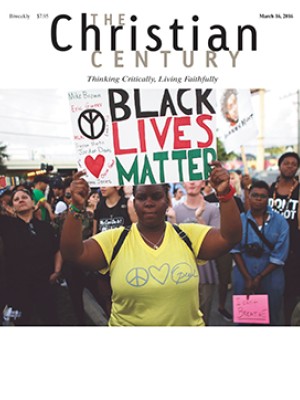Black love of black people: Black Lives Matter symposium
White Christians have to decide: will we show up and act for racial transformation, or will we sit idly by? But BLM isn't waiting to see what our verdict will be.
The Black Lives Matter movement that has unfolded in cities and on campuses across the nation is writing a new chapter in black people’s struggle for liberation. We asked writers to reflect on what the movement has accomplished, where its energies should be focused, and what implications it has for churches. (Read all responses.)
The Black Lives Matter movement isn’t particularly concerned about how a white American like me assesses it. And in some ways, this is precisely the point. When Alicia Garza, Patrisse Cullors, and Opal Tometi created the hashtag that has truly been heard ’round the world, they were unapologetically focused on black love for black lives. This love is invoked again and again in the ritual chant heard any time Black Lives Matter activists gather (a chant aptly described as liturgical given its transformative power): “It is our duty to fight for our freedom! It is our duty to win!”
Read our latest issue or browse back issues.
The movement has had measurable victories. Abuses of African Americans in the court systems have been the norm in Missouri since the state entered the union, and Michael Brown’s killing was a piece of this history. But by the end of 2015, no doubt as a result of the Ferguson resistance, 45 state measures aiming to reign in police tactics were being pursued there. The indictment of the officer who killed Walter Scott in South Carolina is another victory for the movement.
Yes, devastating failures to hold police accountable continue—the decision not to charge the officer who killed 12-year-old Tamir Rice being the most recent and perhaps most egregious. But the public scrutiny and outrage needed to uproot deeply entrenched power was essentially nonexistent before Black Lives Matter.
More victories will come. Black Lives Matter has enabled sustained public resistance in diverse locales and at levels not seen in the United States for a very long time. Hundreds of activists shut down the Mall of America and the Minneapolis airport before Christmas to protest the police killing of Jamar Clark. Thousands took to Chicago streets, blocking commerce during Thanksgiving, to protest police misconduct. The energy and passion galvanized by Black Lives Matter bespeaks a movement that is growing and strengthening. This movement is defiantly proclaiming a vision of justice that requires business as usual policies and practices to be overthrown.
As a movement, Black Lives Matter is decentralized (though there are 26 official chapters), and it has a diverse list of goals. Atrocities in U.S. criminal justice systems are a major focus, but it has also declared solidarity with residents of Flint, Michigan, for example. Ultimately, every aspect of U.S. social life (education, economics, unemployment) is a viable target for this movement because the goal is black freedom, everywhere.
This brings me back to the point with which I began. What have such fierce public and prophetic declarations, paired with a willingness to mobilize and put bodies on the line, done and continue to do to (or for) white people and our perceptions? In unapologetically rooting itself in black love for black life and black commitment to black freedom, the movement has thrown down a gauntlet to white Americans. This gauntlet lies particularly close to the feet of white Christians who would claim to believe that we’re called to follow Jesus and that Jesus’ ministry had something to do with announcing “good news to the poor and setting free the oppressed” (Luke 4:18).
It’s no longer possible for anyone to live in a mushy middle in terms of commitment to the black freedom struggle. No longer can white Christians say, “We didn’t really know.” Black Lives Matter has named with precision the diverse practices that allow subjugation of black life to continue. It has created protest spaces where people are showing up to say “enough.” No longer can we say, “We’re just not sure what to do.”
White Christians and churches have to decide. Will we show up and act for racial transformation by creating solidarity in/with/through Black Lives Matter or will we sit idly by as this movement transforms history? But Black Lives Matter isn’t waiting to see what that verdict will be. It’s simply moving and will continue to do so. And this is because of its foundational power: black love of black people.





